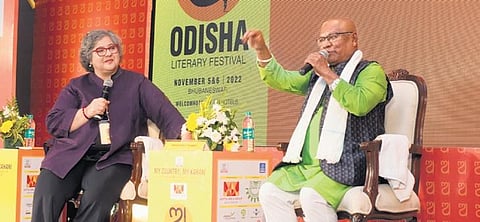

BHUBANESWAR: No one should call a Dalit by his caste or look down on downtrodden. This has been my fight for the entire life, said rickshawala-turned-popular writer-turned-politician Manoranjan Byapari on Saturday. In conversation with festival coordinator Kaveree Bamzai at Odisha Literary Festival 2022 here, during a session on ‘From Rickshawala to MLA: How I Rewrote my Life’, the Trinamool Congress MLA from Balagarh Assembly seat in West Bengal said he is completely against the religious beliefs, books and caste system that propagate ill-treatment towards Dalit and downtrodden as a ‘virtue.’
“We never call ourselves Dalit. We consider ourselves as humans. However, it is the caste-ridden society that imposes the Dalit tag on us. Why is it so? In what way we are less than others?” Byapari asked. Being a Dalit, Byapari said he has experienced it very closely. “The caste system in our society is still so deep that after becoming an MLA for sometime, I had to request the SP in my area not to appoint any person belonging to upper caste as my security guard.”
Byapari admits that he had no intention to enter politics. “After the level of politics in West Bengal deteriorated and the kind of threats I started receiving forced me to join politics,” he said.
He said, “I have spent my whole life in a thatched house. I also had to spend around eight years in a railway station. And when I continued writing I received threats that I will have to meet the fate of Gauri Lankesh. But why?”
When asked if West Bengal Chief Minister Mamata Banerjee has read any of his books, he said, “I haven’t asked her. But I think she has read my books for which she picked me as a candidate.”
Byapari during the conversation also lamented that writing as a profession does not pay well enough. “In West Bengal, anyone who picks writing as a career has to do something else for a living. Even I started earning as a writer after 40 years of struggle. That itself is a huge fight,” he said. Manoj Basu’s ‘Nishikutumbo’, a book evolving around the life of a thief, had a huge impact on him. “That was the book I read first,” he said.